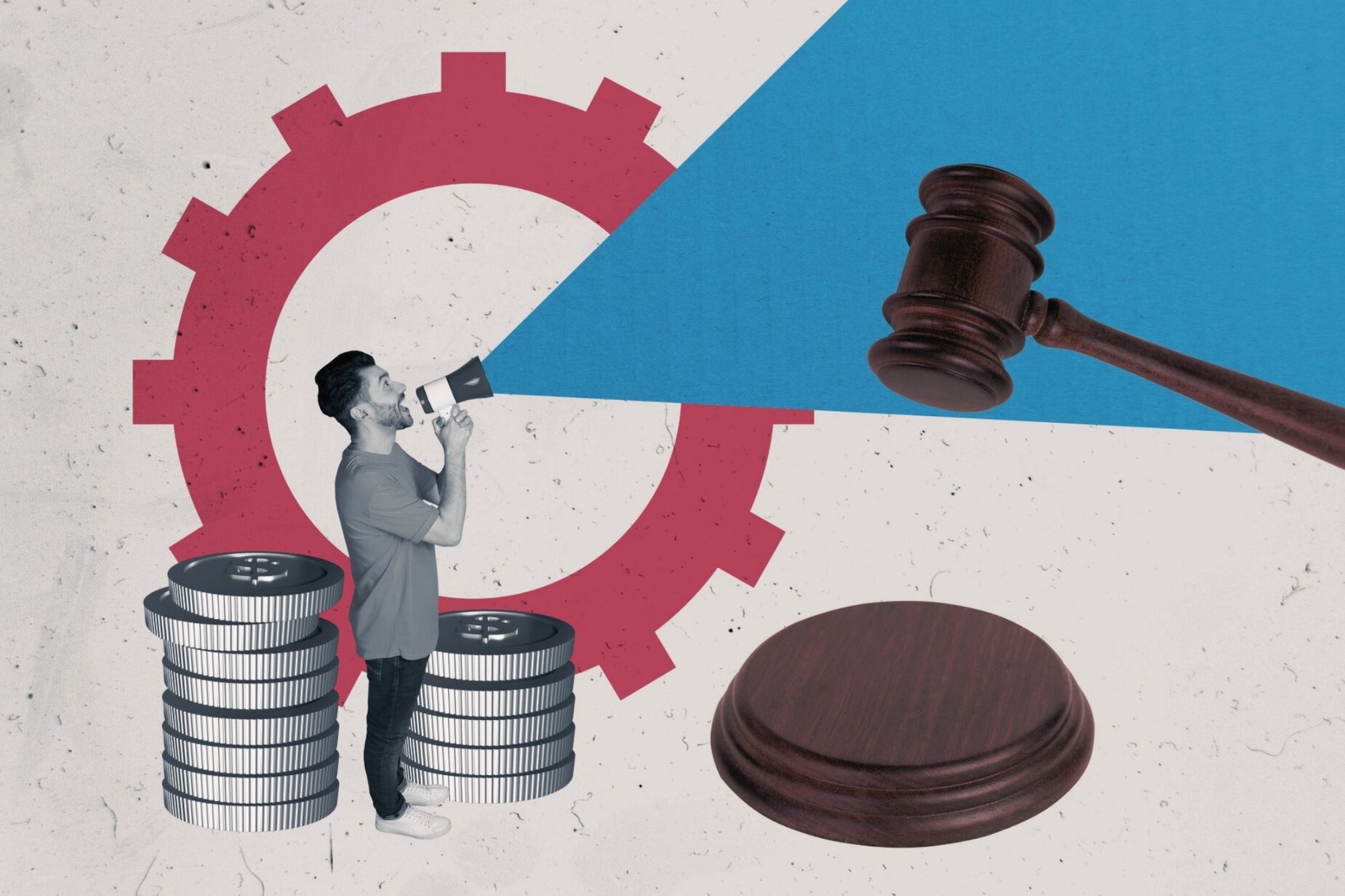Sianne Ngai’s Theory of the Gimmick continues her project of looking at how aesthetic categories shape labor, value, and everyday experience.
Over the course of her career, scholar and critic Sianne Ngai has asked readers to interrogate the everyday aesthetic judgments we make about art and objects. While finding kitty cams, baby carrots, and bath toys “cute” might seem innocent, Ngai cautions that a term like “cute” is ultimately rooted in a desire to “aestheticize powerlessness,” a useful tool for making commodification and consumption feel, conversely, empowering. Ngai explores the assumptions about political economy underpinning “cute” and similar terms in her 2012 book Our Aesthetic Categories: Zany, Cute, Interesting. In that book, which won the Modern Language Association’s James Russell Lowell Prize for excellence in literary criticism, Ngai explored the ways that our aesthetic judgements have been molded and transformed by the logic of late capitalism. The “zany,” perhaps best embodied by the image of Lucille Ball stuffing chocolate bonbons into her mouth while working on the conveyor belt, encapsulates, Ngai argues, our growing sense that the boundary between labor and play has begun to dissipate. “Interesting,” our most ubiquitous aesthetic judgment, represents a demand to prolong our critical labor, or as Ngai puts it, “Let’s keep on talking about this movie, let’s continue giving it attention, even though it is not particularly good.”
In her latest book, A Theory of the Gimmick (2020), Ngai proposes another aesthetic category, “gimmicky,” to think through broader questions about how artistic worth is measured in capitalist culture. The gimmick, as a kind of labor-saving device that ironically overperforms (i.e., doing too much), is an embodiment of our anxiety about the way value is tied to labor. Gimmicks, Ngai explains, from cryptocurrency to Marcel Duchamp’s ready-mades to the late fiction of Henry James to hair products that overpromise, fill us with a sense of mistrust or irritation because we sense a mismatch between the amount of labor encoded in them and their proclaimed value. In doing so, we register a sense that labor and value are at once intertwined and perhaps should not be. In essence, we begin to doubt the entire system we live by.
For Ngai, one of the reasons the gimmick is so important is that it “tells us something about how ordinary people process capitalism.” Indeed, Ngai’s work, starting with her first book, Ugly Feelings (2009), has been devoted to exploring so-called minor, unprestigious, or everyday aesthetic experiences, ones typically shunned by the field of philosophy (which has largely focused on the Enlightenment categories of the beautiful and the sublime). “Gimmicky,” like “interesting” and “cute,” is a word that we use spontaneously in daily speech. In this way, Ngai’s work is invested in a kind of aesthetics at the margins and the way aesthetics can be levied against (and defiantly wielded by) the most marginalized.
Ngai spoke with me by telephone from her home in Chicago. We discussed Puff Daddy, the Fyre Festival, capitalism’s shiny broken promises, and what cultural criticism sounds like in a bar.
—Jennifer Wilson
Jennifer Wilson: So I made a list of just some of the various gimmicks you identify over the course of the book: Google Glass, stainless steel banana slicers, the Fyre Festival, Hamburger Helper, the novels of Henry James, pencil sharpeners, an entire book written without the letter “e”—just to name a few. Can you tell us what makes these things gimmicks?
Sianne Ngai: Let’s take the example of the pencil sharpener design that’s in the book—a Rube Goldberg cartoon. Starting in the late 1920s, Goldberg drew hundreds of devices he called “inventions,” machines ostensibly supposed to help people save time but that were in fact elaborate contraptions involving lots of parts to accomplish a simple task. [Goldberg’s pencil sharpener involves 19 steps culminating with a woodpecker emerging from a cage to sharpen the pencil.] What’s put on display is an excessive amount of effort to achieve a minimal result. Goldberg’s pencil sharpener is an allegory of the gimmick in that it’s a labor- and time-saving device that doesn’t save labor but in fact increases it. It’s a great model of the gimmick’s problematic relationship to labor, of how it’s either overperforming or underperforming or often both at the same time.
JW: You write that the gimmick is “capitalism’s most successful aesthetic category” but also “its biggest embarrassment and structural problem.” Can you break that contradiction down for us—if it is a contradiction?
SN: The gimmick is successful in that it lies latent in every capitalist commodity. At the same time, to call something gimmicky is to say it’s a failure, it’s unconvincing. So the gimmick is not just an impoverished form. It’s an aesthetic judgement—and spontaneous evaluation—that is also a diagnosis of value not being where it is purported to be. By calling something a gimmick, we are saying it’s over-valued, and this counter-evaluation stems from appraisals of the amount of labor and time encoded in the object. It’s worth noting that the gimmick is our only aesthetic judgment indexing the way in which these three variables—value, labor, and time—come to be inextricably linked under capitalism. The judgment thus gets at the core of how our economic system works, but it does so obliquely, at the aesthetic level. Nonetheless, to use the term is to register doubt about that system.
JW: What is the doubt we’re registering when we call something gimmicky?
SN: It’s first and foremost an aesthetic dissatisfaction, but one that immediately refers to an economic misgiving. And that misgiving is the feeling that there is something ultimately wrong about the way capitalism produces and measures wealth.
There’s also this layer of begrudging acknowledgment that even if this thing isn’t convincing to me, it will be or has already been convincing to others. In other words, my experience of the gimmick always includes an awareness that the gimmick is not a gimmick for other people: Someone will go for the banana slicer or cryptocurrency future (and indeed, we as a collective body already do). So while predominantly negative or critical, our aesthetic judgment also includes a recognition of how socially powerful the promises of capitalism are—of how they manage to remain appealing and collectively effective in spite of being perpetually broken.
JW: You write that the word “gimmick” first appears in print in the 1920s. What about that specific historical moment gives rise to this understanding of the gimmick and the aesthetic value being attached to labor-saving?
SN: I’m cautious about making historical claims based on etymology, but we can’t ignore that the word becomes trackable right around the inauguration of a long period of economic crisis and global recession. It doesn’t seem coincidental that in the English language we would start to have a codified concept for something that is breaking its promise to deliver value at a moment where people were seeing that promise broken all around them. The timing of the word’s emergence in the early 20th century also helpfully underscores that “gimmick” is an aesthetic specific to mature, crisis-prone capitalism (which is not to say that there weren’t things before then that we wouldn’t be tempted to call gimmicks now). One suspects that usage of the term spikes at moments when things are falling apart economically.
JW: How does Theory of the Gimmick build on your last book, Our Aesthetic Categories: Zany, Cute, Interesting?
SN: There is certainly a throughline. Our Aesthetic Categories similarly focuses on aesthetic forms and judgments that tell us something about how people process capitalism, even in their ordinary or casual ways of talking about pleasure. The argument there is that what makes the cute, zany, and interesting so prevalent in contemporary culture and discourse is that they index the socially binding ways in which people work, exchange, and consume. The gimmick is, however, more than just a fourth category. The gimmick is a much bigger aesthetic phenomenon. Rather than indexing a specific phase—say, circulation as opposed to production—it points to the unstable dynamics of capitalist value production as a whole.
I’m aware I keep emphasizing ordinary talk. Both books argue that academic philosophy’s almost exclusive reliance on “the beautiful and the sublime” to theorize aesthetic experience has resulted in a neglect of the vernacular judgements people use in daily life, which are just as theoretically interesting. I wanted to pay attention to these aesthetic concepts and treat them with the same philosophical seriousness. The “gimmick” is a word you might hear at a bar or on a bus. So the appraisal of something as a gimmick is around us all the time.
JW: I’m wondering if there are cases in which one artist’s gimmick is another’s genius. I’m thinking of those Puff Daddy songs that came out in the late 1990s with all the samples from previous decades. There were all these music critics at the time bemoaning it as a trend toward the unoriginal. I even found one who called his use of samples “gimmicky,” but samples are in fact really common. I’m just wondering if you think there are certain people who, when they wield something, it gets called “gimmicky,” and when other people wield it, it’s treated differently?
SN: I like your example—I’m now vividly recalling his sampling of “Every Breath You Take” in “I’ll Be Missing You.” The Police original is horrible, but the Puff Daddy version works. Art often takes up the gimmick form deliberately. Edgar Allen Poe loved gimmicks, and he made use of them as gimmicks, in “The Raven” and, even more so, “The Philosophy of Composition,” his tongue-in-cheek essay on the making of “The Raven,” where he says the entire poem is made of devices calculated to bring off “poetic” effects. Announcing in deadpan that one will of course have to start with the ultimate poetic theme, the “death of a beautiful woman,” then add a catchy refrain and so on, he’s essentially modeling, in a Rube Goldberg–like way, all the techniques one needs for the production of literary value. Poe, Duchamp, Rube Goldberg, Henry James (with his love of literary tricks), and why not add Puff Daddy—all of these artists flirt with the gimmick to some degree.
JW: I’m glad you brought up Poe and Duchamp, because I think one of the things people love about your work is how eclectic your archive is—from Hamburger Helper to 1970s labor documentaries to Cubism. Not to harp on Puff Daddy, or maybe to harp on Puff Daddy…
SN: Ha ha, I have no strong thoughts about Puff Daddy.
JW: I didn’t realize I did either until just like five minutes ago. What I was getting at, and maybe Puff Daddy wasn’t the best example, but when, say, black artists do something that could be construed as labor-saving, does that get construed differently? I’m thinking about things like welfare, stereotypes about laziness. Do you see racialized artists or art forms getting labeled gimmicky in ways that wouldn’t happen with other artists?
SN: There’s a moment in Emergency Exit (1979), the experimental novel by Clarence Major, where a critic compares the narrator/Major to John Barth and calls Barth’s writing “a gimmick.” The critic’s use of “gimmick,” while overtly aimed at a style of literary postmodernism associated with creative writing programs, is racially tinged: an insinuation that Major has been trying to be “the black John Barth.” In response, Major reclaims the term and starts to insert the word everywhere in his paragraphs, in part to underscore that what the critic calls a gimmick is really just language.
This is interesting, because some of the strongest indictments of the gimmick using the specific word come from African American activists. I’m thinking of a moment in “The American Revolution: Pages From the Negro Worker’s Notebook” (1963) when James Boggs, the Detroit autoworker, denounces the “gimmicks” of “well-meaning liberals” pushing inadequate reforms in response to the systematic expulsion of labor from US manufacturing as capital moved on to more profitable sectors. And of a truly electrifying rant we hear in the 1970 documentary Finally Got the News from Ken Cockrel, a member of the League of Revolutionary Black Workers, against the “whole credit gimmick society.” So the work of people of color can be objects of the judgment that something is gimmicky, but people of color can also wield the judgment in aesthetically powerful ways.
JW: Reading this book, I started thinking about some of the other aesthetic judgements I find myself making. For instance, the other day, I was about to compliment something for being “effortless,” but because I’d just read your book, I thought, What am I actually saying? Are there other words like that, words like “the gimmick,” that we use really often in criticism that we don’t typically think of in terms of labor?
SN: Oh no! “Effortless” is a lovely utopian word! “The gimmick” is actually an indictment of the failure of something to reduce effort in the way it purports. It’s funny because some reaaders of Our Aesthetic Categories told me they had a similar anxiety about using “interesting” after reading that chapter, when my intent was to show how useful this evaluation is, and precisely because there is something empty about it. Your question points to synonyms for “gimmicky” which are the direct opposite of “effortless”—“belabored,” for instance, or “contrived.” “Contrived” is worth lingering on because it gets at the same ambiguity the gimmick encodes.
JW: My last question: What’s your favorite gimmick?
SN: That’s the thing about gimmicks—they’re sometimes annoyingly lovable and strangely fun to talk about. I’m a sucker for a lot of literary gimmicks, including metafictional reflexivity. I also own an egg-cooking machine from Aldi which many would see falling in the same category as the banana slicer, but which I will swear by. But my favorite gimmick is probably the “quick-burning paper” for “Lady Fair Cigarettes” that Janeane Garofalo’s character invents in Romy and Michele’s High School Reunion. Lady Fair’s slogan is “Twice the taste in half the time for the girl on the go.” One couldn’t ask for a better summary of the logic underlying this aesthetic category!


















